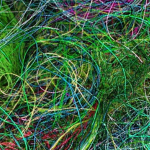The Divisiveness of Revisionist Tolerance
In a fantasy landscape, two streams churn together at a juncture in the terrain. Looking back along one stream to the east, the traveler sees it cut a red line into the distance, that being the hue of its water. The other peeks out less visibly along its path, coming from the west, a blue tincture. Here, at the intersection, they join and travel along in a shade of purple.
Generations ago, travelers from a civilization to the east followed the red stream to this spot, and being more numerous and more fastidious about keeping records, they’ve defined the area’s history. Their natural bias (which few these days would deny) often led them to treat the combined flow as a continuation of the one that they’d traced from their origin. Indeed, some have gone so far as to insist that it is still red — albeit, of a richer type.
More recently, those who consider themselves enlightened have sought to elevate the people who inhabited the area when the easterners arrived. To them, whatever color the combined flow might be, it is a consequence of the blue. Indeed, any claim that the red-stream folk might make upon the goodness of the purple is sure to bring a critical response — nigh upon an accusation of theft. The beauty, in this view, is a function of the blue, which tempered the ugly red. Indeed, any admiration of the purple must be tempered (perhaps suppressed) with the ritual acknowledgement that it required the adulteration of the blue stream.
The traveler pauses on this spot and shakes his head. He has his own opinion of what shade of purple burbles off into the distance before him, but in the nearby village, such debate is not permitted. There, long discord (which he suspects derives from entirely unrelated matters) lets none escape the imperative to decide whether purple itself is a shade of red or of blue.
This allegory came to mind as I listened to Bill Bartholomew interview Providence activist Raymond Two Hawks Watson. The two agree that our historical understanding of New England prior to the arrival of European colonists is murky and probably understates the numbers of indigenous people, as well as the nature of their civilization. This, they take to be an indication that history remembers that society in a deliberately worse light than deserved. To be sure, historians of the past might have questioned whether it should be called a “civilization” at all.
However, they seem to take that murkiness as an opportunity to assume the opposite: That Roger Williams’s revolutionary tolerance was not of his own invention, but merely a whole-cloth theft of the society into which he stumbled when his own had expelled him with intolerance. In extreme variations of this way of thinking, moderns owe a statement of dependence to such cultures, as if everything we are is attributable to them.
Rod Dreher posted a letter he received from a Canadian reader about the practice of “territorial acknowledgment” in his country. According to the writer, it started in academic presentations, wherein “the speaker lists the various aboriginal tribes that lived on or near the speaker’s present location, and thanks those tribes for allowing him to use the land.”
These statements are now omnipresent. Children in schools are required to recite them at the beginning of each day, business meetings open with them, they are read before football and hockey games, and concerts and lectures invariably begin with one. Returning to the original discussion of the dissolution of national bonds in our countries, the damage that these statements cause is incalculable. The effect is to present Canada as an illegitimate, criminal state, whose population has no right to live in this hemisphere. Saddled by this original and irremediable sin, non-Aboriginal Canadians can do nothing but confess their wickedness, ask for forgiveness, and pledge to help “decolonize” the country (i.e. raze our institutions). To make matters worse, it is now common practice in Canada to refer to all non-Aboriginals as “settlers.”
Most striking in all of this is the complete loss of our sense that we are ultimately one people. We’ve all arrived in this world with a familial legacy of good and bad behavior somewhere in the past. Our culture is an amalgam of it all, the toxic and the beautiful in all of our ancestries, and it makes no sense to stare back along the streams.
Those of us with advantages and comfort have a responsibility to help those without them because we are all one family (God’s children), not because our ancestors might have taken something unfairly from theirs. The wealthy man has an obligation to the poor man of the same color whose father squandered his grandfather’s wealth, just as he has an obligation to the poor man whose family has never managed to recover from some centuries’ old oppression. For that matter, the wealthy descendant of slaves has an obligation to the poor descendant of slave holders.
This, however, is an individual obligation of person to person assessing his or her circumstances. It is not a legal claim that a third party can enforce. That would remove the moral benefit to the giver and the recipient both.
Perhaps our loss of religiosity has something to do with our deteriorating sense of shared responsibility. If we can’t express our mutual obligation in terms of a moral requirement from on high, then we must justify it in terms of some material debt. It isn’t enough to say we’re all here contributing and making imperfect decisions about how to help each other. We’re not peers sharing an experience of the same time in history, but the current soldiers in an ongoing war of group against group.




